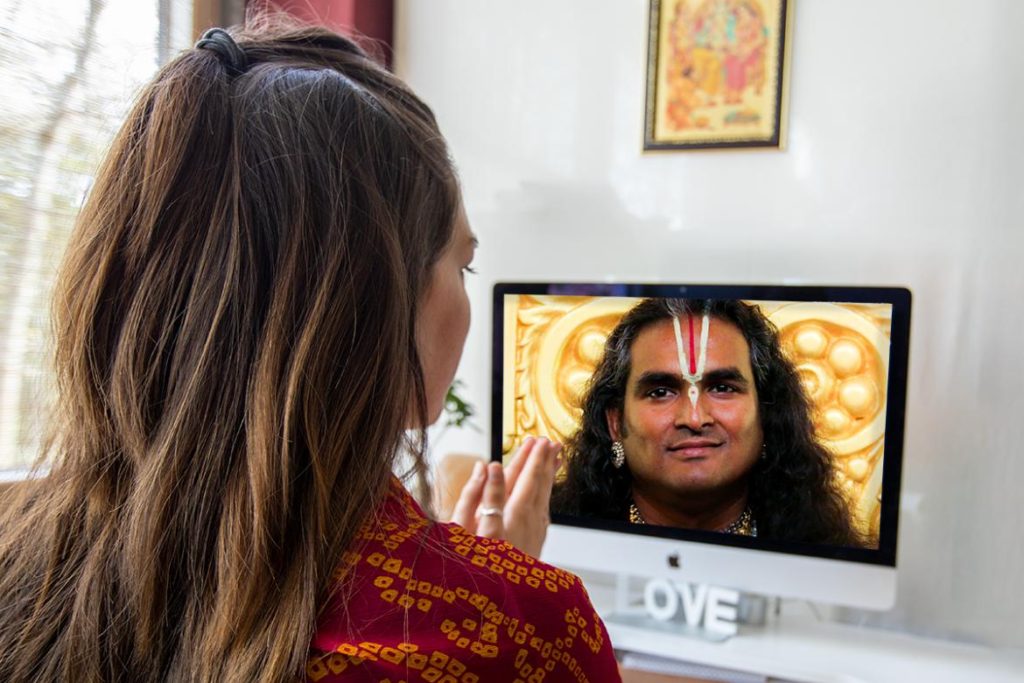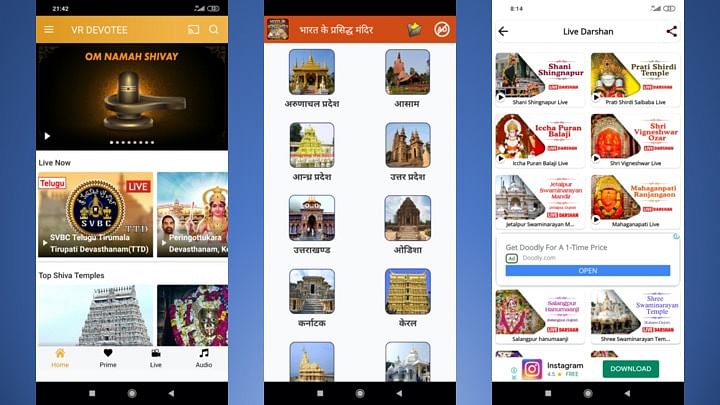By Tanya Mittal

The lockdown for COVID-19 pandemic in India has ensured a complete shutdown of all places of worship. Since India has a predominantly religious minded population that worships one deity or the other, the use of Virtual Reality in Darshan is slowly becoming an actual reality. Instead of removing footwear before Darshan, people now need to strap on headgear because new products introducing virtual reality (VR) and augmented reality (AR) are helping people go to any place of worship with footwear. The government is going to slowly ease the imposed restrictions with time and as places begin to unlock, religious institutions such as temples, churches, mosques, and gurudwaras would be among the last to open publically. This is being done to follow social distancing both in word and spirit.
Recently Alia Bhat received a lot of criticism for using her mobile phone to record late actor Rishi Kapoor’s final rites. Media sources later confirmed that she was actually video-conferencing with Rishi Kapoor’s daughter Riddhima who wasn’t present physically due to the lockdown. This pandemic has completely changed the way people mourn as well. Conventionally a Pandit is required to conduct the religious ceremonies, but in the wake of current unprecedented situation many families today have no option but to say goodbye (pay their shraddhanjali) to their loved ones through a live streamed shraadh. Many news websites reported the use of Zoom or Skype app during funerals. These are rare and uncertain times, as the lockdown is affecting the fundamental ritual of performing the last rites as per Hindu norms, which is the immersion of ashes. Families are unable to take the ashes to pilgrimage sites like Kashi or Haridawar due to travel restrictions and have no option but to leave the urns in lockers at the crematoria.
As the age old saying goes “where there is a will there is a way”- so people need something to fuel this will during difficult times like these.Technology has come to their aid as a blessing from God and devotees are using it to reach out to their religious communities in large numbers online and trying to find solace in their faith. Though social distancing requires people to be physically apart, people still yearn to be in the loving embrace of God but that too has become very difficult as places of worship are inaccessible at present. This too is a reason for distress as lack of access to spaces for praying and finding solace has become overwhelming.
Therefore Virtual darshan is playing the role of the Good Samaritan by binding communities as people can now perform aartis sitting in the comfort of their drawing rooms. Temples have started to ramp up live darshan and e-Puja features on their websites for devotees; especially senior citizens who are stuck at home and don’t want to miss their daily rituals. Many pujaris or priests have started webcasting Aartis and uploading the daily prayers on Facebook and other social media. The lockdown has also affected business revenue of the places of worship (donations and daan), as devotees had to stop visiting; but thanks to technology, apps allow streaming “live darshans” and enable users to contribute their donations online. Some apps like The Live Darshan, i2i Live, Aastha, Shemaroo Bhakti, Kalpnik app etc have user friendly interface to allow direct video-streaming feed from cameras set up in various temples.

One click on the list of temples in the apps can offer a view of the daily rituals at various temples. Devotional songs, Bhajans,travel routes, and maps are also provided for the convenience of Pilgrims. Exhaustive websites of holy shrines like Vaishno Devi, Sri Balaji temple, and Mathura Vrindavan, are using technology to benefit their devotees as well.
Meanwhile some religious institutions are still open for people in need. Many Gurudwaras in Delhi have increased hygiene practices and continued community Langars with social distancing rules in place. Wash basins and soaps are provided at the entrance of most functioning temples or gurudwaras and the staff use gloves and masks while cleaning or serving. In fact, many daily wage earners and small business owners, who are facing economic hardships because of the shutdown, come regularly for these Langars at the Gurdwaras according to media reports. Others use technology to their benefit to hear live audio kirtans and prayers on their phones.
Besides these apps, famous temples such as the Tirumala temple in south India have their own apps through which people can book puja slots or make online donations. Talking of the flipside, as people look for some hope and right information at this time regarding the pandemic, cyber criminals are using the occasion to scam web users.As the pandemic spreads, covid-19-related cyber frauds are also on the rise. A lot of fraudsters and fake astrologers sell fake ‘miracle cures’ and even convince devotees to share their OTP (one-time password) for online consultations and vanish as soon as the bitcoins in the form of Daan and Dakshina are credited into their accounts, thereby multiplying the agony and trauma faced by the public. These malicious programmers can track all our online activity easily. We have definitely welcomed these new multipurpose apps to make our lives better, and their effectiveness is well established, but there’s a flipside too. The impending danger of letting AI (Artificial intelligence) controlled apps into our lives is that sooner or later, our gadgets will have the nasty power to control us.
Following suit, are we going to go digital in our beliefs too with our technological dependence as the world remains locked indoors? Will this be the desirable turn of events in the future? Is this not challenging the essence of visiting shrines and temples altogether to be in physical proximity of our chosen deities? Because that’s what we’ve been doing since forever- visiting temples and holy places for years and years as per customs. The unsolved query remains whether we have willingly accepted this new way of life or has this been forced onto us.
Tanya Mittal, a writer at Itisaras is currently pursuing her undergraduate degree in History from Lady Shri Ram College, University of Delhi. Belonging to an armed forces family, she has had an opportunity to appreciate the vibrancy that India offers. She is an avid reader and wishes to pursue a career in International Relations.


Beautifully written
Brilliant article….so true in present scenario this will be so easy for older generation….
..liked it
Excellent expression.
There has been a fair amount of speculation about how technologies such as AI/VR will impact our lives. But I haven’t really encountered much on how these technologies will affect the way of worship. Interesting take!
Wow very beautifully written …And very true … Very useful for every one ..
Great initiative !!!.. seems futuristic , still connected to the roots ..
Great initiative !!!.. seems futuristic , still connected to the roots ..